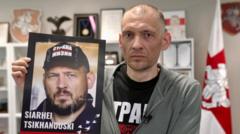The recent ruling against Tidjane Thiam has ignited concerns over the state of democracy in Ivory Coast, reflecting deep-seated issues of identity politics and exclusion within the nation.
Is Ivory Coast Blocking Democracy with 'Red Card' Politics?

Is Ivory Coast Blocking Democracy with 'Red Card' Politics?
Grappling with a legal verdict, Tidjane Thiam’s presidential aspirations highlight challenges to political integrity in Ivory Coast.
In the heart of the political arena, Ivory Coast—known for its rich cocoa production and vibrant football culture—faces a profound dilemma just months ahead of its presidential elections. Tidjane Thiam, an internationally reputed business executive and a candidate for the Democratic Party of Ivory Coast (PDCI), has found his ambitions thwarted by a government ruling that stripped him of his Ivorian citizenship due to his French nationality acquired decades earlier.
Thiam's aspirations surged after returning to the country in 2022, positioning him as a potential successor to the aging President Alassane Ouattara, who is rumored to seek an unprecedented fourth term. However, a recent court decision has fatal implications, declaring that Thiam lost his citizenship nearly four decades ago and cannot participate in the upcoming vote.
Having made a name for himself as a leader in global finance, Thiam's political career appeared to be taking a promising turn when he was chosen as the PDCI candidate following the passing of long-time opposition leader Henri Konan Bédié. The ruling leaves not only Thiam, but also other significant political rivals like former President Laurent Gbagbo and Prime Minister Guillaume Soro sidelined, raising fears of an uncontested election for Ouattara's ruling party.
This situation deepens scrutiny of Ivory Coast's democratic processes, which have faced significant challenges in the past due to ethnic tensions and identity-based politics. Recent events echo memories of past disputes, particularly the controversial "ivoirité" law that previously barred Ouattara from presidential candidacy based on his alleged foreign roots.
Despite the nation’s economic resilience, which has recovered impressively since the civil unrest of the early 2000s, Thiam's saga spotlights the hazardous intersection of identity and politics. The court's ruling hinges on a stringent interpretation of citizenship laws, which complicate dual nationality and potentially disenfranchises many Ivorians with foreign ties.
Thiam, in defense, pointed out the absurdity of the situation, drawing comparisons between himself and the national football team, which boasts players of dual nationality. As this legal battle unfolds, pressure mounts for political negotiations or a public outcry to enable Thiam's presidential candidacy.
Historically, the lead-up to elections has inspired significant public engagement in West Africa but, given the current political landscape, there is rising concern for democratic integrity in Ivory Coast. With the elections looming, the future for political diversity and true representation remains uncertain.
Thiam's aspirations surged after returning to the country in 2022, positioning him as a potential successor to the aging President Alassane Ouattara, who is rumored to seek an unprecedented fourth term. However, a recent court decision has fatal implications, declaring that Thiam lost his citizenship nearly four decades ago and cannot participate in the upcoming vote.
Having made a name for himself as a leader in global finance, Thiam's political career appeared to be taking a promising turn when he was chosen as the PDCI candidate following the passing of long-time opposition leader Henri Konan Bédié. The ruling leaves not only Thiam, but also other significant political rivals like former President Laurent Gbagbo and Prime Minister Guillaume Soro sidelined, raising fears of an uncontested election for Ouattara's ruling party.
This situation deepens scrutiny of Ivory Coast's democratic processes, which have faced significant challenges in the past due to ethnic tensions and identity-based politics. Recent events echo memories of past disputes, particularly the controversial "ivoirité" law that previously barred Ouattara from presidential candidacy based on his alleged foreign roots.
Despite the nation’s economic resilience, which has recovered impressively since the civil unrest of the early 2000s, Thiam's saga spotlights the hazardous intersection of identity and politics. The court's ruling hinges on a stringent interpretation of citizenship laws, which complicate dual nationality and potentially disenfranchises many Ivorians with foreign ties.
Thiam, in defense, pointed out the absurdity of the situation, drawing comparisons between himself and the national football team, which boasts players of dual nationality. As this legal battle unfolds, pressure mounts for political negotiations or a public outcry to enable Thiam's presidential candidacy.
Historically, the lead-up to elections has inspired significant public engagement in West Africa but, given the current political landscape, there is rising concern for democratic integrity in Ivory Coast. With the elections looming, the future for political diversity and true representation remains uncertain.





















